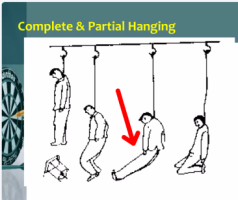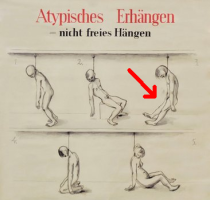I did not know that the carotid sinus' role in loss of consciousness was debated. I am not saying it's you are wrong and I am right, only that what I read stated it as fact.
Unfortunately, though, I've read through so many medical journals and articles, I cannot honestly recall where I read this. I'm leaning towards the KRA Cuff study during WW2, though. It's easy to find on the Internet, and since that took place almost 80 years ago, indeed you may be correct in that this initial presumption could be wrong.
When the KRA Cuff was revised to be more dependable in occluding the carotid arteries, indeed they did put the cuff lower on the neck (at the base), so that the vertebral arteries were also effected. The fact that they moved the cuff further away from the carotid sinus nerve, tells me that you might be right.
On the other hand, I am currently having a discussion with another member here about the North Korean spy Black Venus, who claimed that instead of being issued a cyanide capsule like most spies, he was taught to commit suicide (if he was captured) using his fingers and some certain pressure point on the body. At first I thought this sounded a little ridiculous, but the other forum member I mentioned was able to dig up an article of a healthy, 20yo who accidentally dropped dead when his brother grabbed him by the throat, He did not choke him or occlude the carotids, because, it seems, pressure was applied quickly and then let go.
We are trying to figure out what in the hell happened, and thinking that maybe this is what the Korean spy was referring to. It would have to be something that would cause an instantaneous heart attack or something, because simple occlusion of the carotids would obviously result in a loss of pressure once the muscles relax after loss of consciousness.
Do you have any thought on this?


